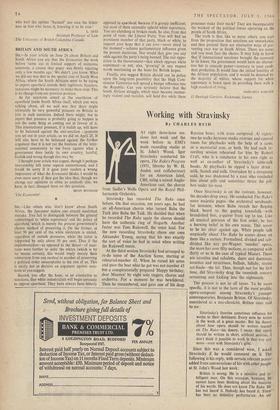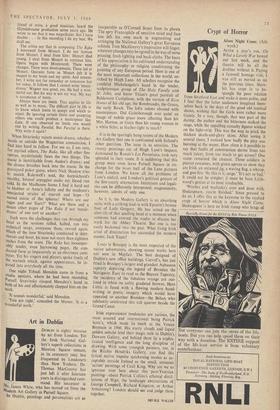Working with Stravinsky
By CHARLES REID
Stravinsky has recorded The Rake once before. On that occasion, ten years ago, he had an all-American chorus who turned Baba the Turk into Baba the Toik. He decided that when he recorded The Rake again the chorus should have the authentic ring of Hogarth. Another factor was Tom Rakewell, the tenor lead. For the new recording Stravinsky chose our own Alexander Young, saying that his was exactly the sort of voice he had in mind when writing the Rakewell music.
At the third session Stravinsky had arranged to re-do some of the Auction Scene, starting at rehearsal-number 43. When he raised his arms and gave the beat what he got was not number 43 but a conspiratorially prepared `Happy birthday, dear Maestro' by eight solo singers, chorus and orchestra. For a moment he was bewildered.' Then he remembered, and gave one of his deep
Russian bows, with arms outspread. At eighty- two he walks between studio rostrum and control room for playbacks with the help of a cane, or a secretarial arm, or both. He had each re- cording session rehearsed for him by Robert Craft, who is a conductor in his own right as well as co-author of Stravinsky's table-talk books. At playbacks he sipped a layer drink : milk, Scotch and milk. Overtaken by a streaming cold, he was shadowed by a man who reminded him about pills and sometimes thrust the pill- box under his nose.
Once Stravinsky is on the rostrum, however, the decades drop away. He conducted The Rake's more majestic pages—the orchestral sarabande, for instance, where Baba reveals her flowing black beard to the gaping townsfolk—with brandished fists, a-quiver from top to toe. Like all musical geniuses of the first order, he has a burning belief in his own music. This seems to be his elixir against age. When people talk sceptically about The Rake he comes down on them like a meteor. Formalised, divided and sub- divided like any pre-Wagner `number' opera, the score has over fifty sections, as compared with thirty or so in the case of typical Mozart. There are cavatina and cabaletta, duets and duettinos, terzettos and terzettinos, ballads, lullaby, stretto act-finale—the lot. Thus, though not for the first time, did Stravinsky drag the twentieth century screaming and kicking into the eighteenth.
The process is not to all tastes. To be more specific, it is not to the taste of the most prolific opera-composer among Stravinsky's younger contemporaries, Benjamin Britten. Of Stravinsky, considered as a neo-classicist, Britten once said tome: Stravinsky's theories sometimes influence his works to their detriment. Every note he writes is the work of a great master. But his theory about how opera should be written reacted on The Rake—his theory, I mean, that opera should be written in short, artificial sections. I don't think it possible to work in that way any more—even with Stravinsky's gifts.
Since this was a considered view, I asked Stravinsky if he would comment on it. The following is his reply, with certain relevant points added from conversations of his with other people at St. John's Wood last week: Britten is wrong. He is a sensitive and in- telligent man. On this occasion, however, he cannot have been thinking about the meaning of his words. He does not know The Rake. He has not heard it. Nobody has heard it. There has been no definitive performance. An old
friend of mine, a good musician, heard the Glyndebourne production some years ago. He wrote to me that it was magnificent. But I have doubts . . . In this recording I do my best. We shall see.
The critics say that in composing The Rake I borrowed from Mozart. I do not borrow from Mozart. I steal from him: Mozart died young. I steal from Mozart to continue him. Opera began with Monteverdi. There were changes. There were developments. These led to Mozart. Operatic form as Mozart left it is shaped to my brain and my spirit. And remem- ber, I write not for yesterday or tomorrow but for today. It follows that I cannot write 'music- drama.' Wagner was great, yes. He had a won- derful ear. But his way is not my way. My way is acceptance of limits.
Always there are limits. That applies to life as well as to music. The difficult part in life is to know which limits to accept and which to reject. By ignoring certain limits and accepting others one could produce a masterpiece like Lulu. If one observed no limits one would end by writing Parsifal. But Parsifal is there. Why write it again?
When Stravinsky rejects music-drama, whether inside or outside the Wagnerian connotation, I find him hard to follow. For me as, I am sure, for myriad others, The Rake, like all other fine operas, mysteriously fuses the two things. The music is inextricable from Auden's drama; and the drama breathes back into the music. In the graveyard poker game, where Nick Shadow tries to snatch Rakewell's soul, the harpsichord's stealthy, bitonal arpeggios make my blood run cold, In the Madhouse Scene I find it hard not to blubber at Anne's lullaby and the madmen's interjected strains of marvel and hope—'0 sacred music of the spheres! Where are our rages and our fears?' What are these and a dozen other pages of The Rake if not 'music- drama' of one sort or another?
Such were the challenges that ran through my head as the sessions rolled, halted, ran into technical snags, overcame them, revved again. Much of the time Stravinsky conducted in shirt- sleeves and beret, his nose not more than eighteen inches from the score. The Rake has incompar- ably tender, even harrowing pages. He con- ducted these as impassively as an electronic com- Puter. Yet his singers and players spoke freely of the warmth which, against appearances, he in- jected into everybody all the time.
One night Yehudi Menuhin came in from a studio upstairs, where he had been recording Purcell. Stravinsky clasped Menuhin's hand in both of his and affectionately clapped him on the neck.
It sounds wonderful,' said Menuhin.
'You are right,' conceded the Master. 'It is a Wonderful work.'































 Previous page
Previous page